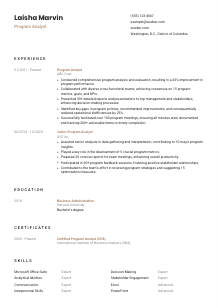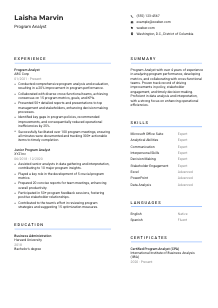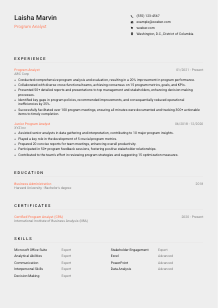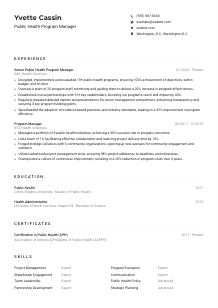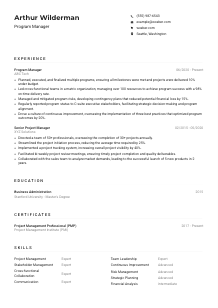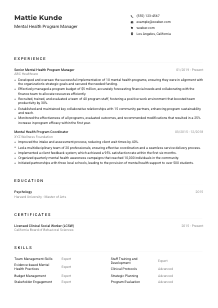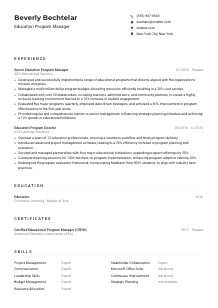Program Analyst Resume Example
Cracking codes, but your resume doesn't translate? Dive into this Program Analyst resume example, shaped with Wozber free resume builder. Discover how to align your analytical insights with job specs, ensuring your career trajectory hits execute on the right command!
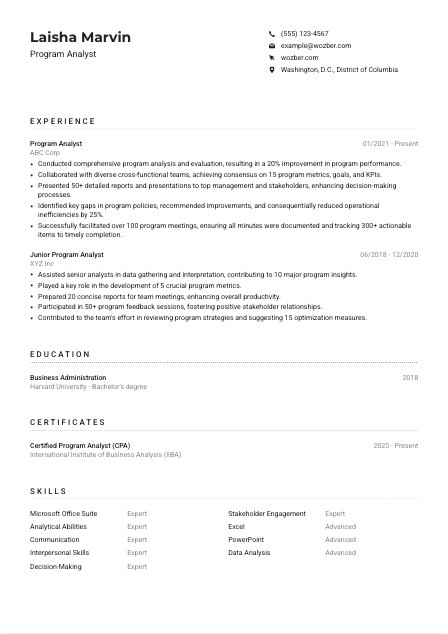
How to write a Program Analyst Resume?
Hello, aspiring Program Analyst! If you're set on dazzling your future employer with a resume that not only hits the mark but also showcases your unique analytical prowess, you're in exactly the right place. Crafting an ATS-compliant resume that stands out in the competitive field of program analysis requires more than just listing your experiences — it demands strategy, insight, and a bit of finesse. Utilizing the free resume builder like Wozber, you can leverage the best resume-writing practices and ATS-friendly resume templates.
This comprehensive guide will walk you through creating an irresistible resume, tailor-made for your dream Program Analyst role. Get ready to make your resume not just seen but remembered.
Personal Details
The Personal Details section of your resume is your opening act. It's more than just contact information; it's your first opportunity to make an impactful impression. Tailoring this section for a Program Analyst position means aligning your details to fit the job flawlessly. Here's how to do just that, ensuring your personal touch shines through.
1. Highlight Your Name
Your name is essentially your brand. Make it memorable with a clear, professional font. This isn't just about aesthetics; it's about making your name a beacon for your entire resume.
2. Position Title Precision
Just below your name, accurately include your target position - "Program Analyst". This mirrored job title form the description instantly aligns your resume with the hiring manager's expectations, setting a focused trajectory from the get-go.
3. Contact Details: The Essentials
Provide your phone number and a professional email address (think firstname.lastname@gmail.com) to ensure you're easily reachable. Triple-check these for accuracy to avoid missed opportunities.
4. Geographic Sweet Spot
"Must be located in Washington, D.C., District of Columbia"- matching this criteria upfront in your contact details demonstrates logistical compatibility, showing you're in or willing to be in the pulse of program analysis activity.
5. Web Presence: A Professional Window
Include a link to a professional profile or personal website if available. Ensure it's polished and mirrors the professionalism of your resume, acting as a dynamic extension of your application.
Takeaway
The Personal Details section sets the stage. Tailor it with precision to reflect the professional and location requirements of your Program Analyst role. View this section as your professional handshake, initiating a compelling conversation about your suitability for the position.





Experience
The Experience section is where your resume begins to truly narrate your career story. This is your chance to showcase how your past roles have perfectly prepared you for the Program Analyst position you're eyeing. Let's dissect how to crush this section by aligning your previous accomplishments with the Program Analyst job requirements.
- Conducted comprehensive program analysis and evaluation, resulting in a 20% improvement in program performance.
- Collaborated with diverse cross‑functional teams, achieving consensus on 15 program metrics, goals, and KPIs.
- Presented 50+ detailed reports and presentations to top management and stakeholders, enhancing decision‑making processes.
- Identified key gaps in program policies, recommended improvements, and consequentially reduced operational inefficiencies by 25%.
- Successfully facilitated over 100 program meetings, ensuring all minutes were documented and tracking 300+ actionable items to timely completion.
- Assisted senior analysts in data gathering and interpretation, contributing to 10 major program insights.
- Played a key role in the development of 5 crucial program metrics.
- Prepared 20 concise reports for team meetings, enhancing overall productivity.
- Participated in 50+ program feedback sessions, fostering positive stakeholder relationships.
- Contributed to the team's effort in reviewing program strategies and suggesting 15 optimization measures.
1. Job Description Breakdown
Start by dissecting the job description. Highlight phrases like "Conduct data analysis," "Collaborate with cross-functional teams," and "Prepare and present detailed reports". This will be your blueprint for tailoring your experience.
2. Chronological Clarity
Organize your roles in reverse chronological order, giving prominence to relevant recent positions. Ensure each role is clearly marked with job title, company name, and date range to paint a clear picture of your career path.
3. Achievement-Oriented Statements
For each role, articulate your achievements that mirror the job requirements. Use bold action verbs and focus on outcomes like "Led a cross-functional team to a 25% efficiency increase by optimizing program operations".
4. The Power of Quantification
Numbers speak volumes. When you say "Improved program performance by 20%," it gives a tangible measure of your impact. Find opportunities to quantify your successes for added effect.
5. Relevance is Key
Maintain a laser focus on experiences that resonate with the Program Analyst role. Extracurriculars are great, but here, you're curating a narrative of tailor-fit expertise and proven results in program analysis.
Takeaway
Your experience section is a gold mine of evidence supporting your candidacy for the Program Analyst position. Strategically curate it to spotlight your relevant achievements, using quantification and targeted accomplishments to construct a compelling career narrative. Remember, this is where your career story shines; make every word count.
Education
While it might appear straightforward, the Education section is an essential part of your resume, laying the groundwork for your qualifications. For a Program Analyst position, aligning your educational background with specific job requirements demonstrates you have the requisite knowledge base. Here's how to ensure this section underscores your fit for the role:
1. Match Key Requirements
First off, match the job's educational requirements. If the job asks for a "Bachelor's degree in Business Administration, Finance, or a related field", ensure your degree is accurately listed. This direct correspondence showcases your foundational fit.
2. Simple and Streamlined Structure
Maintain a clean structure: Degree title, field of study, institution name, and graduation year. This straightforward format ensures your qualifications are easily digestible at a glance.
3. Degree Detailing
If your degree aligns exactly with the job requirement, such as a Bachelor's in Business Administration, make it prominent. This direct tie can significantly strengthen your application.
4. Course Relevance (Optional)
For roles requiring specialized knowledge, including relevant coursework can be an asset. Considering the Program Analyst role involves analysis and stakeholder engagement, listing relevant courses could offer added value, despite not being explicitly required.
5. Highlight Achievements (Optional)
Include academic distinctions or relevant extracurricular activities to further underscore your dedication and capability. For more seasoned roles, prioritize experiences and results over academic accolades.
Takeaway
Your Education section is more than a formality; it's proof of your preparedness for the Program Analyst role. Ensure it reflects the requisite degree and field, using the section to bolster the narrative of your readiness and alignment with the job's demands. With this, you create a well-rounded portrait of your qualifications.
Certificates
In the evolving world of program analysis, certifications act as badges of honor showcasing your ongoing learning and expertise. While not explicitly required for the Program Analyst position, well-chosen certifications can set you apart. Let's delve into curating a certification section that complements your arsenal of skills:
1. Targeted Certificate Selection
Quality trumps quantity. Choose certifications that are directly relevant or highly regarded in the field of program analysis. For example, a Certified Program Analyst from the International Institute of Business Analysis (IIBA) directly speaks to your specialized know-how.
2. Validity and Recency
Ensure to list the acquisition dates, especially for certifications that require renewal. This demonstrates to hiring managers that your expertise is fresh and up-to-date.
3. Continuous Professional Development
Showcase an attitude of continuous learning by updating and adding new certifications as you progress in your career. This displays a dedication to staying ahead in your field, a trait highly valued in program analysts.
Takeaway
While certifications may not make or break your application for a Program Analyst role, they enhance your resume by evidencing a commitment to professional growth and expertise in your field. Strategically select and present certifications to further distinguish your candidacy, showing you're not just qualified, but passionate and forward-thinking.
Skills
In the realm of Program Analysis, the Skills section of your resume is your evidentiary showcase of expertise. Here, you get to distill the essence of what makes you an exceptional candidate. Let's dive into tailoring this section with a precise blend of hard and soft skills to match the demands of your dream role:
1. Charts analysis
Start with a thorough analysis of the job description. Identify both stated and implied skills. Phrases like "strong quantitative and analytical abilities" and "proficiency in Microsoft Office Suite, particularly Excel and PowerPoint" should dictate the skills you highlight.
2. Mirror and Match
Directly match your skill set with the job's demands. For instance, list your expert proficiency in Microsoft Office Suite, advanced abilities in data analysis, and strong communication skills. This clear alignment demonstrates you possess exactly what they're looking for.
3. Quality Over Quantity
Resist the urge to list every skill you possess. Opt for a curated selection that directly speaks to the Program Analyst's role, ensuring a focused and impactful Skills section.
Takeaway
Your Skills section is a crucial part of the narrative, conveying your preparedness and apt fit for the Program Analyst position. Approach it as a showcase, presenting a compelling inventory of your capabilities. Through precise alignment and careful selection, demonstrate to the hiring manager that you're not just a candidate; you're the candidate.
Languages
In a field where communication and data interpretation often cross geographic and cultural boundaries, your linguistic prowess can be a standout skill. The ability to operate effectively in English was explicitly stated, but let's explore how framing your language skills can underscore your global competence:
1. Essential Language Highlight
Given the requirement, your English language proficiency should be listed first, clearly marked as 'Native' or 'Fluent' to immediately assure hiring managers of your communication capabilities.
2. Additional Languages
Subsequently, list any additional languages you know. This not only showcases your versatility but also positions you as a candidate ready to navigate a diverse work environment or stakeholder network.
3. Accurate Proficiency Ratings
Utilize terms like 'Native', 'Fluent', 'Intermediate', and 'Basic' to describe your language skills, ensuring clarity about your level of proficiency and potential roles in multilingual contexts.
4. Global Scope
For positions needing interaction across borders or with international stakeholders, articulating your multilingual skills can give you a significant edge, potentially making you a preferred choice for global-minded employers.
Takeaway
In summarizing your language skills, you're not just listing your competencies; you're illustrating a facet of your versatility as a Program Analyst. Particularly for roles with a broad or international scope, your linguistic abilities can act as a bridge, expanding your professional reach. Embrace your multilingual skill set as both a personal achievement and a professional asset.
Summary
The Summary section is your resume's hook, designed to capture attention and entice further reading. For a Program Analyst, it's your chance to frame your narrative, highlighting what makes you not just a fit, but an outstanding candidate. Crafting a summary that's both compelling and reflective of the job requirements requires strategy and insight. Let's navigate this together:
1. Decode the Essence
Start by immersing yourself in the role's essence, absorbing every requirement and desired skill. Your understanding of the position forms the backbone of your summary.
2. Concise Introduction
Introduce yourself with a statement that summarizes your professional standing and areas of expertise. Mention your years of experience and any special focus areas, positioning yourself as a well-suited candidate for the Program Analyst role.
3. Distill Key Attributes
Cherrypick a handful of your most compelling attributes and successes that resonate with the role's requirements. This might include your analytical abilities, experience with data analysis, and a proven track record of enhancing program performance.
4. Precision Pitch
Keep your summary tight and to the point. Aim for a potent blend of your experiences and skills that signals to hiring managers why you're the right fit for this Program Analyst position.
Takeaway
Your summary is the gateway to your resume, inviting hiring managers to dive deeper into your narrative. By crafting a summary that's succinct yet evocative, you not only showcase your suitability for the Program Analyst role but also set the tone for the detailed accomplishments that follow. Make it impossible for them to not want to know more about you.
Embarking on Your Program Analyst Journey
With these insights and strategies at your disposal, you're ready to craft a Program Analyst resume that not only ticks all the boxes but also captivates and convinces. Use Wozber's free resume builder to create an ATS-compliant resume that shines in both content and format. Remember, your resume is more than a document; it's a narrative of your professional journey, tailored to your dream role. Adjust it, infuse it with your unique essence, and let it be your ambassador.
Your next career opportunity is out there, waiting for you to seize it. All systems go, Program Analyst; your future awaits!

- Bachelor's degree in Business Administration, Finance, or a related field.
- Minimum of 3 years of experience in program analysis or a related field.
- Proficiency in Microsoft Office Suite, particularly Excel and PowerPoint.
- Strong quantitative and analytical abilities to interpret complex data and develop insights.
- Excellent communication and interpersonal skills to collaborate with stakeholders and present findings.
- Must be able to operate effectively in English.
- Must be located in Washington, D.C., District of Columbia.
- Conduct data analysis and evaluation to support program performance reviews and decision-making processes.
- Collaborate with cross-functional teams to develop program metrics, goals, and KPIs.
- Prepare and present detailed reports and presentations to management and stakeholders.
- Review program policies and procedures, identify gaps, and make recommendations for improvement.
- Facilitate program meetings, document minutes, and track action items to ensure timely progress.





